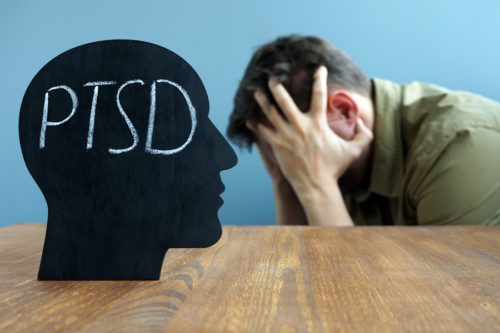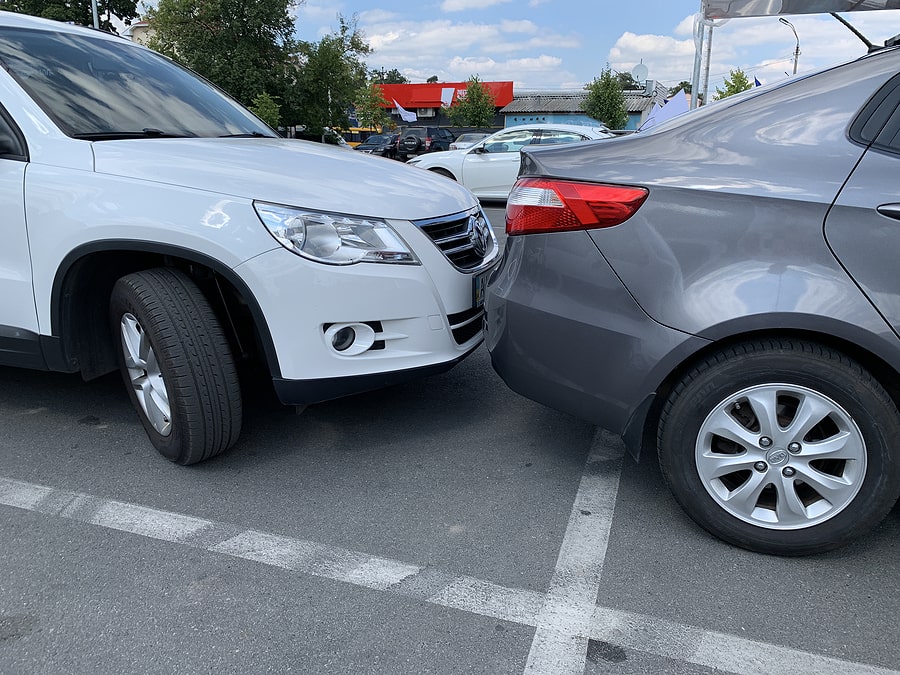Appointments. Bills. Repairs. You’re dealing with a lot after a car accident, and you might be most concerned about your finances or your physical injuries.
But what about the mental effects?
Post traumatic stress disorder (PTSD) is one concern people tend to initially overlook or try to brush off, but the relationship between PTSD and car accidents is clear.
A meta-analysis of studies on the prevalence of PTSD in auto accident survivors found shocking results: over 22% of car accident victims will suffer from PTSD. Their experiences were found to be comparable to those of earthquake survivors and flood survivors.
PTSD goes far beyond emotional distress. Just like a broken bone, psychological trauma after a car accident needs thorough treatment and a recovery plan.
PTSD sufferers deal with intrusive thoughts, avoidance issues, mood swings, flashbacks, and nightmares. These symptoms spread into their everyday lives, causing further anxiety and depression. PTSD from a car accident can significantly impact your quality of life.
Mental health and emotional wellbeing are seldom given the attention they need, especially when overshadowed by something like a car accident injury. But while injuries can heal over time, the psychological trauma of a car accident can take even longer to recover from.
A car accident can have severe psychological consequences for drivers and occupants alike, but insurance companies will try their hardest to invalidate, dismiss, and deny your feelings. They’ll try to make you feel like PTSD doesn’t qualify as a “serious enough” injury or deserve compensation.
Don’t stand for this abuse. Partner with a PTSD lawyer who will put your health and safety first after a car accident.
At Stewart J. Guss, we know PTSD can be a crippling consequence. Below you’ll find more information about PTSD, how it relates to car accidents, and what you can do if you are suffering from PTSD after a car accident.
What Is Post-Traumatic Stress Disorder?
According to the American Psychiatric Association (APA), post-traumatic stress disorder (PTSD) is a mental health condition affecting those “who have experienced or witnessed a traumatic event.” Examples of traumatic events which might lead to PTSD include natural disasters such as hurricanes, tornadoes, and earthquakes, and being a victim of or witness to terrorist acts, war violence, shootings, assault, and serious accidents.
The APA estimates 3.5% of adults in the United States currently suffer from PTSD, and approximately 10% of people will be diagnosed with PTSD at some point in their lifetime. Additionally, women are twice as likely to acquire PTSD than men.
Symptoms of PTSD
Unlike many physical car accident injuries, you won’t notice the symptoms of PTSD in yourself or your loved one for days or weeks after a serious car accident. These symptoms, however, might last for weeks, months, and sometimes years.
PTSD manifests in different ways – not everyone who suffers from PTSD has the same symptoms.
Symptoms of PTSD vary in intensity depending on the person and their history, but may include:
Dissociation: Our brains cope with trauma by disconnecting and suppressing. When this chronically impairs our awareness and leaves us “zoned out,” it is called dissociation. You may dissociate during a car accident or in its immediate aftermath. Just like how a rush of adrenaline can mask your physical aches, dissociation may temporarily mask your mental anguish. Don’t put off getting help until it’s too late.
Avoidant behavior: It’s only natural we would want to avoid something that caused us pain. However, after a car accident, this PTSD symptom can interfere with your life tremendously. Avoidant behaviors can include not driving on a highway or at night, or refusing to even get in a car at all. This avoidance strengthens your belief that driving is dangerous, and this keeps you locked in a cycle of fear. After surviving or witnessing a severe car accident, you may also find yourself avoiding people who were in the car with you, even if they were friends or family members. You may also avoid the location where the accident happened. Additionally, PTSD victims might try to avoid remembering or thinking about the accident, as well as resist talking about the incident and their feelings about it. (PTSD manifests in war veterans in similar ways.) These fears can perpetuate a cycle of antisocial behavior, resulting in….
Detachment and alienation: People with PTSD often withdraw and isolate themselves to avoid anyone or anything that reminds them of the trauma they experienced. They may feel abnormal or unable to relate to others.
Hypervigilance and hypersensitivity: PTSD sufferers might have intense negative reactions to ordinary sights, sounds, or touch. Sometimes they have difficulty controlling their reactions. They might have angry outbursts over little things or behave in a self-destructive manner.
Intrusive thoughts: PTSD victims can have intrusive thoughts that might present in a variety of different ways. Car accident survivors might have flashbacks or recurring nightmares of the accident.
Finally, PTSD doesn’t always occur alone. It can pop up along with other conditions such as:
- Depression and anxiety
- Mood swings and instability
- Alcohol abuse
- Drug abuse
- Agoraphobia
- Vehophobia
- Insomnia
- Memory problems and an inability to focus
Diagnosing PTSD After a Car Accident
PTSD after a car accident is a real problem. You can obtain a PTSD diagnosis from a trusted professional, and your car accident lawyer can connect you to these resources if needed.
Doctors look for specific criteria before they make their decision on a PTSD diagnosis. Typically, PTSD symptoms must persist for over one month. Most people who develop PTSD after a car accident will do so within three months, but symptoms might appear even later according to the APA.
Generally, doctors diagnose PTSD when symptoms cause significant emotional distress and problems functioning in everyday life.
Your Health Is Our Number One Priority
Post-traumatic stress disorder isn’t often discussed in the context of car accidents, but to the victims, it is just as real as their physical pain.
The severity of your injuries does not always influence the severity of your PTSD. If you felt that your life was in danger, even for a moment, there can be lasting consequences to your psyche. The more you try to suppress thoughts about the car accident, the more trouble you may face.
You may also be dealing with a lack of social support. You may feel embarrassed about feelings of fear and helplessness you can’t seem to shake. You may hesitate to tell friends or even doctors about your mental wellbeing.
You could feel paranoid on the road and distrustful fellow drivers. If you think you are partially at fault for the accident, you may also be dealing with guilt. Worse still, if the car accident involved a fatality, you may be burdened with survivor’s guilt.
Proper therapy can help you learn how to healthily process these emotions and overcome them.
Bottom line: PTSD is real, and you deserve real help. If you or a loved one are experiencing any of the previously listed symptoms, seek medical attention as soon as possible.
You don’t have to suffer in silence.
Treating PTSD After a Car Accident
Psychologists, psychiatrists, and other scientists who study PTSD after motor vehicle accidents have come to a consensus on a few different treatments to help you through your struggles. They include:
Cognitive Behavioral Therapy (CBT): CBT is a form of psychological treatment that mental health professions use to treat many disorders, including PTSD. The American Psychological Association (APA) states that CBT relies on several core principles, including recognizing and unlearning harmful patterns and replacing them with healthy coping skills and mindfulness. Ultimately, CBT helps you break out of patterns related to PTSD after a car accident and face your fears.
Supportive Psychotherapy: This treatment is often used in conjunction with CBT. The goal of supportive psychotherapy for those who treat PTSD car accident victims is to help patients cope with their mental anguish and the ways it impacts their daily life. Therapists focus on providing comfort, advice, and encouragement. Additionally, supportive psychotherapy provides an outlet for those who are struggling with PTSD to vent their frustrations.
Eye movement desensitization and reprocessing (EMDR): EMDR has proven effective for PTSD patients, according to the APA and World Health Organization (WHO). By tracking and guiding a patient’s eye movements while they recall a traumatic event, clinicians can “reroute” the brain’s associations. (A similar thing happens during REM sleep cycles.)
Medication: While not always a long-term fix, medication can also be helpful in treating PTSD symptoms.
The length of time a car accident survivor must undergo therapy depends on the circumstances of the accident, the severity of injuries and psychological trauma, and whether or not a fatality was involved. But no matter the case, solutions are available.
Only a licensed psychiatrist can find the treatment that’s right for you, and we here at SJG can help connect you to the therapy and resources you deserve after a car crash.
Reach out for legal counsel today. It’s 100% free and 100% confidential.
Seeking Compensation for PTSD After a Car Accident
If you’ve suffered from car accident PTSD, you deserve compensation, plain and simple.
PTSD settlement amounts vary. How much compensation you can expect depends on the other details of your case – but know that we take your pain and suffering seriously.
Damages you might recover in a settlement include medical expenses, future medical expenses, lost wages, future lost wages, and non-economic damages for emotional distress, loss of consortium, and more.. Some examples of damages related to PTSD after a car accident include:
- Cost for visits to a psychiatrist, psychologist, or other mental health professional
- Travel to and from doctor appointments related to PTSD diagnosis and treatment
- Prescription medications
- Treatment for other issues accompanying the PTSD, such as substance abuse treatment
- Cost of inpatient mental health and treatment programs related to PTSD when applicable
- Compensation for mental anguish
You can be sure the insurance company and/or at-fault party named in the lawsuit will go out of their way to avoid paying a claim. Your attorney must be thorough and aggressive in order to prove negligence. Causation is one of the most contested elements of negligence—that is, your attorney must prove that the accident is what led to your PTSD.
Psychological disorders are difficult to prove. You can’t take pictures of them to show to a court. Plus, serious symptoms often don’t show up for days or weeks after the car accident. The defense will use this to their advantage and make outrageous arguments to devalue your claim and avoid as much financial liability as possible.
If your regular physician has referred you to a mental health professional because they suspect PTSD after a car accident, do not be ashamed. Visit a psychiatrist or psychologist, let them diagnose you, and begin treatment immediately.
As you continue to visit your therapist, they will document your visits, symptoms, and progress. Not only is this the best action for your emotional health, but your medical record will provide valuable evidence to insurance companies and the court to help prove causation, showing that you have PTSD and how it links to the car accident you experienced.
You might also consider keeping a daily journal of your experiences, symptoms, feelings, and anything associated with the car accident. This provides another tool for your attorney to build your case.
Contact an Experienced Auto Accident Lawyer ASAP
If you’re dealing with PTSD while fighting for a fair settlement from a stubborn insurance company, we’re here to help. Choose a car accident law firm that knows the defense tactics and strategies insurance companies use to avoid financial liability.
When depression, anxiety, and other symptoms of PTSD cause you to miss work, withdraw from your daily life, and damage your ability to function, don’t shoulder the financial burden on top of the emotional distress you’re already suffering.
A car accident attorney can handle the details of your case and develop the best strategy to seek the justice you deserve, while you focus on therapy and learning how to cope with or eliminate your PTSD symptoms.
Your PTSD is a real condition worthy of real help.
Never let insurance companies tell you otherwise.
By working closely with trusted treatment professionals and entrusting your case to a skilled personal injury advocate, it’s possible to recover from the symptoms of PTSD and a return to a better life. Start now.





